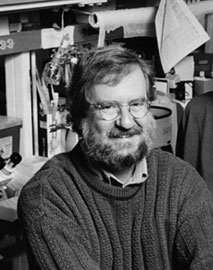|
HOME | SEARCH | ARCHIVE |
|
Researchers find first prostate cancer antigen
Health Sciences Initiative discovery offers hope for vaccine against prostate tumors
![]()
By Robert Sanders, Public Affairs
| |  Professor James Allison’s findings are making inroads in the fight against prostate cancer. Jane Scherr photo |
11 April 2001
|
A discovery by scientists working with the Health Sciences Initiative could lead the way to a vaccine against prostate cancer. The researchers, led by immunologist James Allison, a Howard Hughes Medical Institute investigator and professor of molecular and cell biology, found a protein on prostate cancer cells that tips off the immune system to the tumor’s presence and brings in an armada of immune cells to destroy it. If the protein, called an antigen, is truly unique to prostate cancer cells, it could lead to diagnostics for prostate cancer and a potential vaccine therapy against the disease, which is the second leading cause of cancer death in men, after lung cancer. This is the first prostate cancer antigen found. “The hope is twofold,” Allison said. “One, knowing what the specific target of the immune system is, we can do some very direct studies of whether it is a prognosticator of favorable outcome of disease. And two, we can start thinking about using the antigens to develop a specific vaccine.” Allison, postdoctoral fellow Marcella Fassň, graduate student Rebecca Waitz and their colleagues in the College of Letters and Science reported their findings April 4, at Experimental Biology 2001, one of the largest and most interdisciplinary annual biomedical scientific meetings in the world. Allison, director of the Cancer Research Laboratory, is a member of Berkeley’s Health Sciences Initiative, a collaboration among researchers throughout the campus to tackle some of today’s major health problems. Allison and his colleagues found the cancer antigen by looking in a strain of mice prone to prostate cancer. They treated the mice with a therapy they discovered for unleashing the immune system against prostate tumors — a therapy now in Phase I human trials at two hospitals in California — and looked for those mice that successfully fought off the tumor. From one mouse survivor, they isolated immune cells, called T cells, which play the most important role in protecting the body from cancer, and used them to pluck the antigen out of the many proteins in prostate cells. Once they found the protein, and then the gene for this antigen, they looked in databases and found a corresponding gene in the human prostate that had not been identified before. The corresponding human prostate antigen is the protein that could be used to generate a vaccine against prostate cancer. This method of attack could lead researchers to other antigens involved in tumors and could make vaccine therapies against cancer more widespread. The goal of such vaccines is to generate a massive T-cell response strong enough to eliminate the tumor, even if it has disseminated throughout the body. “We think this method of using mouse models to track down human antigens might be a general method for identifying targets for immunological attack in many different kinds of human tumors,” Allison said. “The most exciting thing about this to me is that you can use mouse models of any cancer to get to the genes in humans.” To date, only a few antigens unique to tumors have been found, limiting the usefulness of vaccination against cancer. Melanoma, an often deadly type of skin cancer, is the exception, with many known antigens; promising vaccine therapies against the disease are now undergoing clinical trials. One of the caveats about this type of vaccine therapy, however, is that vaccines have the potential to attack not only cancerous tissue but also healthy tissue, since the antigens are often present on healthy as well as cancerous cells. Vaccines against melanoma, for example, may attack all pigment-containing cells, melanocytes, both healthy and cancerous. A vaccine against prostate cancer might also kill healthy prostate cells. For now, Allison said, vaccination is most useful when tackling a disease in an organ that is dispensable, such as the prostate or pigmented skin cells. Allison and his team are continuing to characterize the antigen gene, which they dubbed Stimulator of Prostatic Adenocarcinoma Specific T Cells. Having already cloned the gene, he and his colleagues now are looking in other survivor mice for further antigens that could serve as targets for vaccines. “This is the first mouse we’ve looked at, so we have lots more work to do both in prostate and other kinds of cancer, including mammary cancer,” Allison said. “I’m sure this is not the only antigen.”
Home | Search | Archive | About | Contact | More News
Copyright 2000, The Regents of the University of California.
Produced and maintained by the Office of Public Affairs at UC Berkeley.
Comments? E-mail berkeleyan@pa.urel.berkeley.edu.